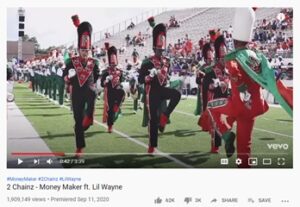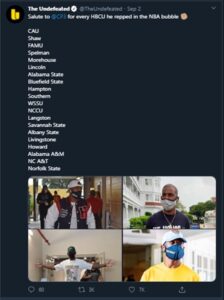
More Black celebrities should cater to HBCUs — and by HBCUs, I mean all HBCUs. Almost each and every one of us has heard about the “Black Ivies,” which commonly includes Howard University, Hampton University, Morehouse College and Spelman College, but there are way more Black colleges and universities that need our attention. Choosing to support the Black Lives Matter movement means you have to support HBCUs as well, and this is directed to those with the platforms, voices and money to keep them alive.
Tauheed Epps, also known as 2 Chainz, recently shouted out over a dozen HBCUs, including FAMU, in his new song “Money Maker.” According to Respect Magazine, the Virginia State University alumnus sampled Southern University’s marching band, the Human Jukebox, and features it on the cover of the hit single. The music video for the song ends in the appreciative words, “HBCUs, we thank you,” and many HBCU students and alumni felt seen by one of hip-hop’s very own.
Along with 2 Chainz, I believe that it’s time for the HBCUs that aren’t as widely known, highly favored and commonly donated to, to finally get the recognition that they deserve. Too many people see the “Black Ivies” as the frontrunners for all HBCUs and focus their investments on them, which leaves other HBCUs struggling to keep their doors open while being under-funded and with fewer resources.
NBC News stated in an article that the “101 Black colleges and universities in the U.S. had their second-lowest student totals in 17 years in the 2018-19 school year.” This means that the preservation of HBCU culture, history and operation throughout the nation is even more imperative than before.
According to the Hechinger Report, 15 HBCUs have closed since 1997 and federal funding for HBCUs declined by 42 percent between 2003 and 2015. The recent trends involving HBCUs continue to show a negative pattern that may lead to irreversible damage as HBCUs like Paine College, Morris Brown College, and Cheyney University struggle to maintain accreditation with insufficient funds.
Blavity News reported that Cheyney University had to fundraise at least $4 million to continue operating in April of 2019, which adds to the list of issues that HBCUs seem to face more than their Predominantly White Institution (PWI) counterparts.

More nationwide attention from famous music artists, actors, athletes and other Black celebrites can help push for more federal funding for every HBCU and influence the next generations to attend one. NBA star Chris Paul continues to prove to the nation the importance of HBCU representation through what is bigger than a fashion statement. From vintage homecoming t-shirts to custom HBCU basketball shoes, Paul has made a huge impact in society’s interest in Black colleges and universities.
Some may say that there is no need for HBCUs any more because Black people should enter spaces with diversity and that they do not prepare young, Black professionals for the real world. As an HBCU student, I find statements like these to be untrue because my university has taught me how diverse Black people can be and how to be unapologetically Black in all kinds of spaces.
HBCUs are full of Black students from different cultures, religions and countries. As this nation faces a modern race war that targets Black people in oppressive and inhumane ways, the need for public support of HBCUs is even more important than ever.
We can only hope for more Black celebrities to increase their efforts in support of HBCUs academically, athletically and financially to preserve one of the most sacred aspects of Black culture — the historically Black colleges and universities that educated our ancestors when PWIs would not.